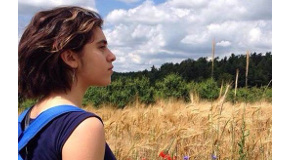
BY LARA ARIKAN
larisarikan@gmail.com
I began to make music in May. I did not know what I would do or how to do it. I didn’t know what it would mean for me. I wanted to, so I did it. I felt it would be good.
My first step was to decide whether I had the musical seed: a natural and, to my mind, artificially unobtainable ability to make music like I did language, making it my own without knowing how I was doing so. I intended to sit down and see whether I could speak this language by making it new, in every second I spoke it, creating from scratch the words I was using, which to me would be the only words in the world. I determined I had this. I have since realized some things.
Writing music is not like writing poetry. It is also very much like writing poetry. The common point is that they both preserve an impression, an abstract and otherwise uncontainable state of existence, by allowing the reader – and the writer – to recreate it. Once composed, the work allows itself to be endlessly remodeled without essentially changing. Both works come naturally in the sense that one cannot plan a track or a poem: one sits down and lets something unnameable and unknown express what it does not know. Or perhaps what it has hidden. Perhaps what it notices as the work is being written. I cannot tell what this source is. I sit down and something comes from me.
The difference is in the nature of language. Poetry, no matter how flexible or innovative, can only reconstruct the common tongue. It belongs to a continuous process of self-construction in which one exists in terms of how one speaks to and of oneself. This specific dialect is not only who one socially is, but also how one defines oneself, for a reason also unknown to me. I only know that I exist as I speak of myself. I exist as I speak words. I believe this is because I think like I speak, and I see what I can put words to – in the sense that I am sensitive to what my language can embrace – and so thoughts and experiences are filtered by language, which therefore shapes the self. Therefore the more flexible my language, the more I exist. The more particular my language, the larger I am. Changes in this self are extremely obvious in poetry: there are islands of aphasia and then new words. The longer the drought, the newer the words. I have no control over them, but exist within them, and they depend on my existence, my openness and boldness: when recessive, I’m speechless; exhausted, I’m nothing. I am nothing when not writing. Sometimes this is liquid; I can receive freely and mold myself to a discovered source of life. Other times it means I’m erased. I feel hollow and fully nonexistent. I can give little of the present and feel mute and blind. I suspect this is forever. It is not forever.
Music does not recreate language. Music simply creates without a past or future. As it is composed it is making from scratch a full and entire new world. The world ends with the track. No two pieces are exactly alike. They are only themselves and contain nothing but themselves. I can associate things with them if I like, but this will never be the truth. The piece has no meaning beyond itself. It has no message or identifiable source. I have made it out of dire necessity. It could not have been unmade. It could not have been made differently, or at a different age. It comes now. Not again. Not ever before. Different from poetry.
I foresee a period when this may change along with the way I compose. Algorithmic music, for example, has a backbone and a road. I write this road and so direct it. But perhaps it will be different. I have never composed algorithmically. I intend to sometime.
Whatever I create, I believe it is personal. Music is intimate: it carries me. This will be so however I make it. I listen to people create their own faces. I give them mine in return.
